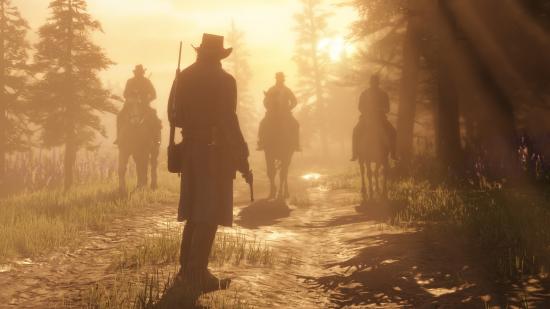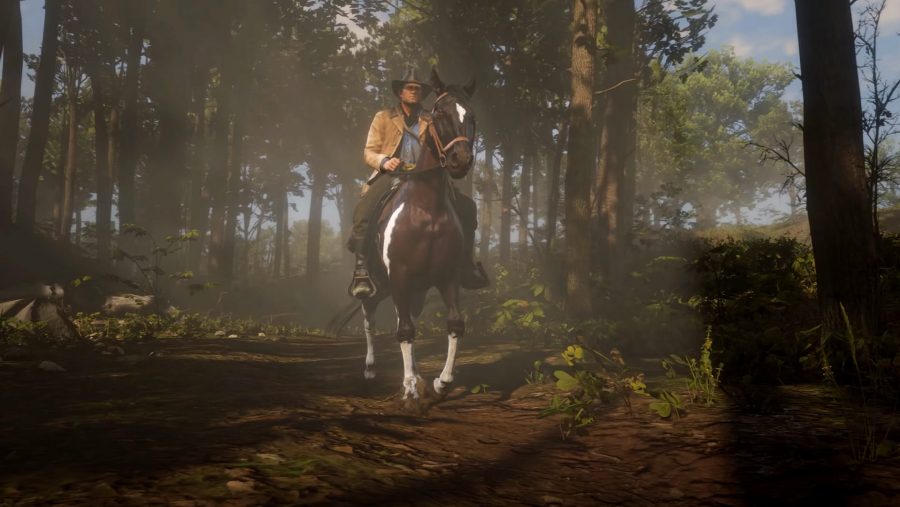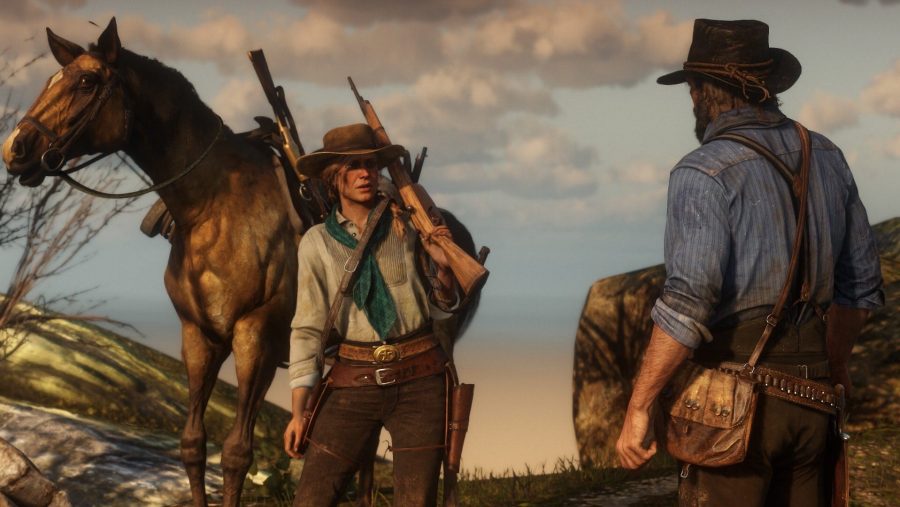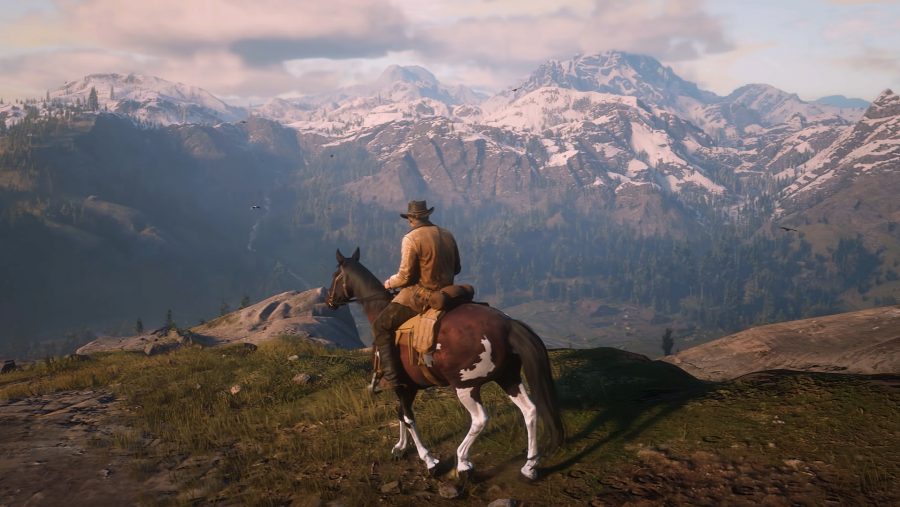On September 21, Telltale Games laid off approximately 250 of its staff, leaving 90% of the studio without jobs. It was sudden. None of the employees were given any prior warning. Instead, the team was told about the layoffs at the start of the workday, and then apparently given 30 minutes to leave the building, with no severance pay and only nine more days of healthcare coverage.
Just a matter of days later, an interview published in October by Vulture had Rockstar studio founder Dan Houser saying some of the team behind Red Dead Redemption 2 had worked 100-hour weeks, and that this had happened multiple times throughout the game’s development.
This isn’t the first time the studio has come under fire for its working practices. In 2010, as Rockstar was preparing for the launch of the first Red Dead Redemption, a group of its employees’ spouses wrote an open letter to express their concern about the working conditions at Rockstar’s San Diego studio. The letter stated that it was “mandatory to work close to 12 hours a day, including Saturdays.”
As people on the outside – fans of games but not involved in their creation – it’s difficult to know what do when hearing these game development horror stories. Should you boycott a game that was made under terrible workplace conditions – will that have any meaningful effect? Should you write to the offending studio in order to express your discomfort?
Learning about these workplace conditions makes me, for one, uncomfortable to be a fan of some games. But, at the same time, I want to continue to support the work of individuals affected by the darker side of game development. What can we do to stand in solidarity with these people while also opposing the practices they work under?
Caught in the Crunch
Game Workers Unite (GWU) formed last year after Jen MacLean, the newly appointed executive director of the International Games Developers Association, commented at a GDC panel that unionisation wouldn’t address many of the biggest challenges facing the game industry. Its main aim, according to Danny Wadeson, a committee member of GWU, is “to protect game workers and promote healthier, better, more sustainable practices across the whole industry.”
Many of the horror stories from game developers include them working into overtime – in other words, crunching. “Broadly speaking, crunch is either unpaid overtime, or it could be paid, but it’s kind of obligated and in the long term essentially forced overtime,” Wadeson tells me.
According to Wadeson, crunch isn’t something developers plan for, but something they resort to. “What often happens is knockdown factors,” he says. “Like a marketing decision leading to deadline changes. It’s mostly caused by mismanagement or a lack of management and planning… it’s hard to produce a game and to accurately figure out how long it’s going to take so it’s a really tough problem.”
Wadeson experienced crunch while working on an E3 trailer for his team’s game called The Last Night, a game that he was lead writer for. The team had a hard deadline, but also had to satisfy the various demands of numerous stakeholders, one of which included ensuring the trailer met all the necessary technical specifications. “That all led quickly to what happened to us, which is a week or two of basically staying up all night and having naps here and there to just meet those demands,” he recalls.
bETTER LEFT UNSAID
Once Vulture’s interview with Dan Houser was published, and it had got around that the Rockstar founder had mentioned working 100-hour weeks, there was outcry. Developers from around the industry harangued Rockstar and stood against the perpetuation of crunch as part of making games.
Soon after, Houser gave a statement to Kotaku, saying that his words had been misunderstood. He clarified that when mentioning 100-hour working weeks he was referring only to the senior writing team at Rockstar, which comprises just himself and three others.
“We obviously don’t expect anyone else to work this way,” Houser stated to Kotaku. “Across the whole company, we have some senior people who work very hard purely because they’re passionate about a project, or their particular work, and we believe that passion shows in the games we release.”
Passion is a word that is used a lot in videogames. It’s used both in the context of the people who play games and those that make them. It’s a term that Wadeson deems “problematic” when used in the way that Houser does in his statement.
“Yes, ok, if you’re passionate you want to work hard and you want to put in the extra time. But if you’re senior management and you stand to earn millions from success of your game then comments like Dan Houser’s are horrible.”
It’s the power imbalance between managers and workers that Wadeson refers to here. He’s highlighting the fact that a person in a position like Houser’s benefits the most from crunch, and is able to opt in – as such, it’s considerably easier for him to discuss and accept the practice. This directly contrasts with the position his employees are in, who could feel like they are jeopardising their jobs if they speak out against crunch, or refuse to work overtime.
“If you imagine you’re in an office of 100 people and your boss says ‘well you don’t have to stay late but it will be good if you do’ that’s a huge unspoken demand for everyone,” Wadeson says. “If you’re the one person that stands up and tries to take the stand then you suddenly feel very replaceable.”
Even when crunch is presented as a ‘choice’, the decisions from upper management to make it part of a company’s working practices can introduce workload expectations, implicit or otherwise. An anonymous QA tester for Rockstar under the username RockstarThrowaway448 spoke out on Reddit about Houser’s 100 hour work week comments, highlighting that although overtime is optional, it’s expected of employees. “If we are not able to work overtime on a certain day without a good reason, you have to make it up on another day,” they claim.
GWU is taking action by wanting to build an organisation that offers “legal and financial backup to contest unfair dismissal.” While not yet large enough to offer financial and legal advice, GWU already offers a network of support to people in the industry.
“If you’re on the cusp of crunching or maybe you’re a bit more junior in the industry,” Wadeson says, “you can go onto the union Discord and you can speak to your reps and ask ‘Is this normal? Am I being exploited? Is this something that happens very often?’ and have that support network to basically navigate the issue.”
WHAT CAN WE DO
But what about us? When we learn that developers had to crunch to release a game, what can we do to help? And does buying that game support and continue the practice?
“Boycotting isn’t necessarily the answer,” Wadeson says. “What we have to remember as fans, and also as professionals in the industry, is that for people that have crunched, just because they’ve been forced to doesn’t mean they’re not still incredibly proud of their work. Unless a developer very specifically called for a boycott of their own game you’re essentially denying the hard work they’ve done.”
There are more positive ways that we can support developers, too. Top of the list is standing in solidarity with devs affected by crunch and giving them support. “Just having people on Twitter or those that directly reach out to you and say ‘Look, this really sucks you have to go through this but I’m really excited for your game’. It can mean a lot of people to have a little bit of emotional solidarity,” Wadeson says.
It’s also a good idea to contact publishers and rights holders to “put pressure” on them to stop crunch practises. Not by threatening a boycott, Wadeson repeats, but saying “we do not accept crunch. As fans you cannot be doing this to your developers.”
Another tactic is to go out of your way to support games that aren’t the product of crunch. Minit developer Jan Willem Nijman started a Twitter thread asking for people to reply with crunch-free games. Wadeson loves this idea: “The more money that flows to crunch-free games the more the industry sits up and takes notice.”
Consumer activism is definitely a way you can support the industry, but this neglects the current developers who are working for and with bigger companies. If you truly care about the work conditions of game studios and want to make a difference then it’s up to to look beyond the product and see what practices you’re funding. Twitter is one way to keep an ear out but also reading and taking part in discussions is another way to see behind the curtain. This is necessary as it’s difficult for developers to talk about working conditions without implicating their co-workers and putting their own job at risk.
“People like Jason Schreier who are doing investigative pieces are so important because being able to talk anonymously to people, it’s the best tool we have – a safe place to be able to whistleblow,” Wadeson says. Schreier is the news editor at Kotaku and has reported on workplace conditions around the industry by giving a voice to the workers. In his latest article, ‘Inside Rockstar Games’ Culture of Crunch’, Schreier speaks to 90 current and former Rockstar employees about their experiences and what they call the “culture of fear” that has formed within the studio since the first Red Dead game.
SPEAK UP
It’s important to pay attention when people speak out about their experiences in the game industry. Now that there is more discussion around it, and more people are realising it’s not just them that feels mistreated, it seems more people are starting to want to enact positive change.
This might explain why Wadeson has seen a surge of international and regional interest in joining Game Workers Unite. “Volunteers that are willing to join the committee, willing to just contribute their time and effort is the coolest thing I’ve seen, I think it’s already helping people, just talking about best practices, just amplifying stories,” he says. “Now the momentum is here, people are are taking a stand.”
One idea GWU has is to create a logo, like the Fair Trade symbol, for developers to put on their store pages. It would be a “certificate for studios who are crunch free,” Wadeson explains. It makes the issue more visible and gives players an easy way to spot games made in a way we’d like to support.
I’m very much in favour of crunch-free logos. Perhaps, in the future, there could even be an award ceremony for studios that avoid crunch, too. Wadeson acknowledges that this could be a great idea but it’s tainted by the sadness that this is necessary at all.
Unionising the industry won’t happen overnight, or through the actions of a single organisation – GWU is just one of the unions that will need to exist. But until that does happen, you can help out by supporting individual talent and demanding better workplace standards at game studios. Crunch shouldn’t be the norm and, no matter how good a videogame is, no amount of harrowing mental or physical stress inflicted during its creation is acceptable.



